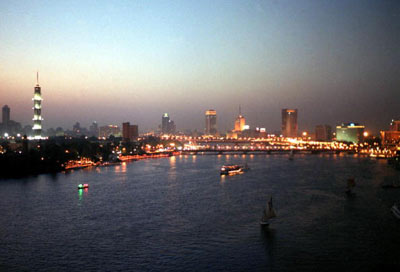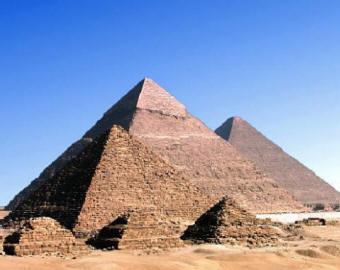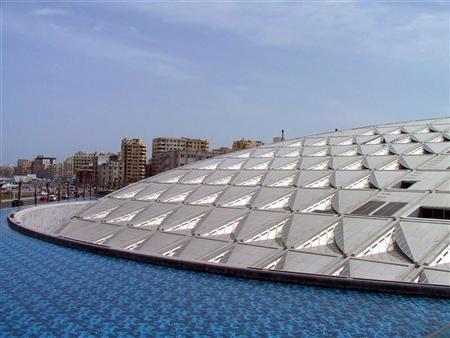Egypt is probably the world's oldest civilization having emerged from the Nile Valley around 3,100 BC, historically. Egypt is probably one of the oldest vacation spots. Early Greeks, Romans and others went there just for fun, and to see the wonders of some of mankind's earliest triumphs. But Egypt is much more than Pyramids and monuments. It is also Red Sea scuba diving, hot night spots, luxury hotels and five star restaurants. It is romantic cruises down the Nile on festive river boats, a night at the grand opera and it is a cultural experience like none you have ever experienced. Egypt is a land bustling with life, sound, visual beauty and excitement. More than anything else, we want you to think of Egypt as fun. For thousands of years, it has been the playground of emperors and kings, and we hope you will take the time to find out why.
BACKGROUND
The regularity and richness of the annual Nile River flood, coupled with semi-isolation provided by deserts to the east and west, allowed for the development of one of the world's great civilizations. A unified kingdom arose circa 3200 B.C. and a series of dynasties ruled in Egypt for the next three millennia. The last native dynasty fell to the Persians in 341 B.C., who in turn were replaced by the Greeks, Romans, and Byzantines. It was the Arabs who introduced Islam and the Arabic language in the 7th century and who ruled for the next six centuries. A local military caste, the Mamluks took control about 1250 and continued to govern after the conquest of Egypt by the Ottoman Turks in 1517. Following the completion of the Suez Canal in 1869, Egypt became an important world transportation hub, but also fell heavily into debt. Ostensibly to protect its investments, Britain seized control of Egypt's government in 1882, but nominal allegiance to the Ottoman Empire continued until 1914. Partially independent from the UK in 1922, Egypt acquired full sovereignty following World War II. The completion of the Aswan High Dam in 1971 and the resultant Lake Nasser have altered the time-honored place of the Nile River in the agriculture and ecology of Egypt. A rapidly growing population (the largest in the Arab world), limited arable land, and dependence on the Nile all continue to overtax resources and stress society. The government has struggled to ready the economy for the new millennium through economic reform and massive investment in communications and physical infrastructure.
HISTORY 

The Great Sphinx and the Pyramids of Giza, built during the Old Kingdom, are modern national icons that are at the heart of Egypt's thriving tourism industry. View of Cairo, the largest city in Africa and the Middle East.
GEOGRAPHY
Egypt is bordered by Libya to the west, Sudan to the south, and by the Gaza Strip and Israel to the east . Egypt'simportant role in geopolitics stems from its strategic position: a transcontinental nation, it possesses a land bridge (the Isthmus of Suez) between Africa and Asia, which in turn is traversed by a navigable waterway (the Suez Canal) that connects the Mediterranean Sea with the Indian Ocean via the Red Sea.
Apart from the Nile Valley, the majority of Egypt's landscape is a desert. The winds blowing can create sand dunes more than 100 feet (30 m) high. Egypt includes parts of the Sahara Desert and of the Libyan Desert. These deserts were referred to as the "red land" in ancient Egypt, and they protected the Kingdom of the Pharaohs from western threats.
Towns and cities include Alexandria, one of the greatest ancient cities, Aswan, Asyut, Cairo, the modern Egyptian capital, El-Mahalla El-Kubra, Giza, the site of the Pyramid of Khufu, Hurghada, Luxor, Kom Ombo, Port Safaga, Port Said, Sharm el Sheikh, Suez, where the Suez Canal is located, Zagazig, and Al-Minya. Oases include Bahariya, el Dakhla, Farafra, el Kharga and Siwa. Protectorates include Ras Mohamed National Park, Zaranik Protectorate and Siwa.
CLIMATE
Egypt does not receive much rainfall except in the winter months South of Cairo, rainfall averages only around 2to 5 mm (0.1 to 0.2 in) per year and at intervals of many years. On a very thin strip of the northern coast the rainfall can be as high as 410 mm (16.1 in), with most of the rainfall between October and March. Snow falls on Sinai's mountains and some of the north coastal cities such as Damietta, Baltim, Sidi Barrany, etc. and rarely in Alexandria, frost is also known in mid-Sinai and mid-Egypt.
Temperatures average between 80 °F (27 °C) and 90 °F (32 °C) in summer, and up to 109 °F (43 °C) on the Red Sea coast. Temperatures average between 55 °F (13 °C) and 70 °F (21 °C) in winter. A steady wind from the northwest helps hold down the temperature near the Mediterranean coast. The Khamaseen is a wind that blows from the south in Egypt in spring, bringing sand and dust, and sometimes raises the temperature in the desert to more than 100 °F (38 °C).
Every year, a predictable flooding of the Nile replenishes Egypt's soil. This gives the country consistent harvest throughout the year. Many know this event as The Gift of the Nile.
MEDIA
Today, the Egyptian media is experiencing more freedom that wasn't available in the near past. Several Egyptian Talk shows, like (90 Minutes) and (Al- Ashera Masa'an), which operate on private channels, and even the state television programs such as (El-beit beitak) are criticizing the Government; this was banned before because the Government was controlling all television programs, but now the public is feeling the freedom that the Government allowed for media.
CULTURE
Bibliotheca Alexandrina is a commemoration of the ancient Library of Alexandria in Egypt's second largest city.
Egypt's capital city, Cairo, is Africa's largest city and has been renowned for centuries as a center of learning, culture and commerce. Egypt has the highest number of Nobel Laureates in Africa and the Arab World. Some Egyptian born politicians were or are currently at the helm of major international organizations like Boutros Boutros-Ghali of the United Nations and Mohamed ElBaradei of the IAEA.
FESTIVALS
Egypt is famous for its many festivals and religious carnivals, also known as mulid. They are usually associated with a particular Coptic or Sufi saint, but are often celebrated by all Egyptians irrespective of creed or religion. Ramadan has a special flavor in Egypt, celebrated with sounds, lights (local lanterns known as fawanees) and much flare that many Muslim tourists from the region flock to Egypt during Ramadan to witness the spectacle. The ancient spring festival of Sham en Nisim (Coptic: shom en nisim) has been celebrated by Egyptians for thousands of years, typically between the Egyptian months of Paremoude (April) and Pashons (May), following Easter Sunday.
SECURITY & SAFETY
Egypt is a truly remarkable place to visit.Safety coupled with an enjoyable stay remains the number one goal for all visitors to Egypt. The Egyptian government, other embassies are committed to providing security for travellers, as well as travel tips to facilitate your visit.
We believe you will have a safe and highly enjoyable stay in Egypt. Over 15,000 Americans live and work in Cairo, with tens of thousands of other non-Egyptians. The Egyptian government takes security very seriously. Since the events of September 11, 2001, travel is back on the rise and excellent opportunities exist to see this interesting country at low cost.
BACKGROUND
Egypt is a wonderful country and Cairo an exciting, busy, crowded city. Egyptians are warm and friendly people who respond immediately to a warm smile. is happy to have you here as a visitor. We are dedicated to making the Cairo and your trip both productive and enjoyable. If there is anything we can do to further these goals, please let us know. This security overview is provided by the Security Consultant to give you a general overview of the security situation in Cairo and elsewhere in Egypt. Despite recent world events Egypt is a relatively safe place to be. As anywhere, things can change quickly, and you should always be aware of world events and of your surroundings. It is recommended that you NOT engage in political discussions within the hearing of anyone you do not know, including drivers.
HOTELS
All hotels generally frequented by tourists and business visitors have adequate security.Stay safe, enjoy your time in Egypt and come back soon



